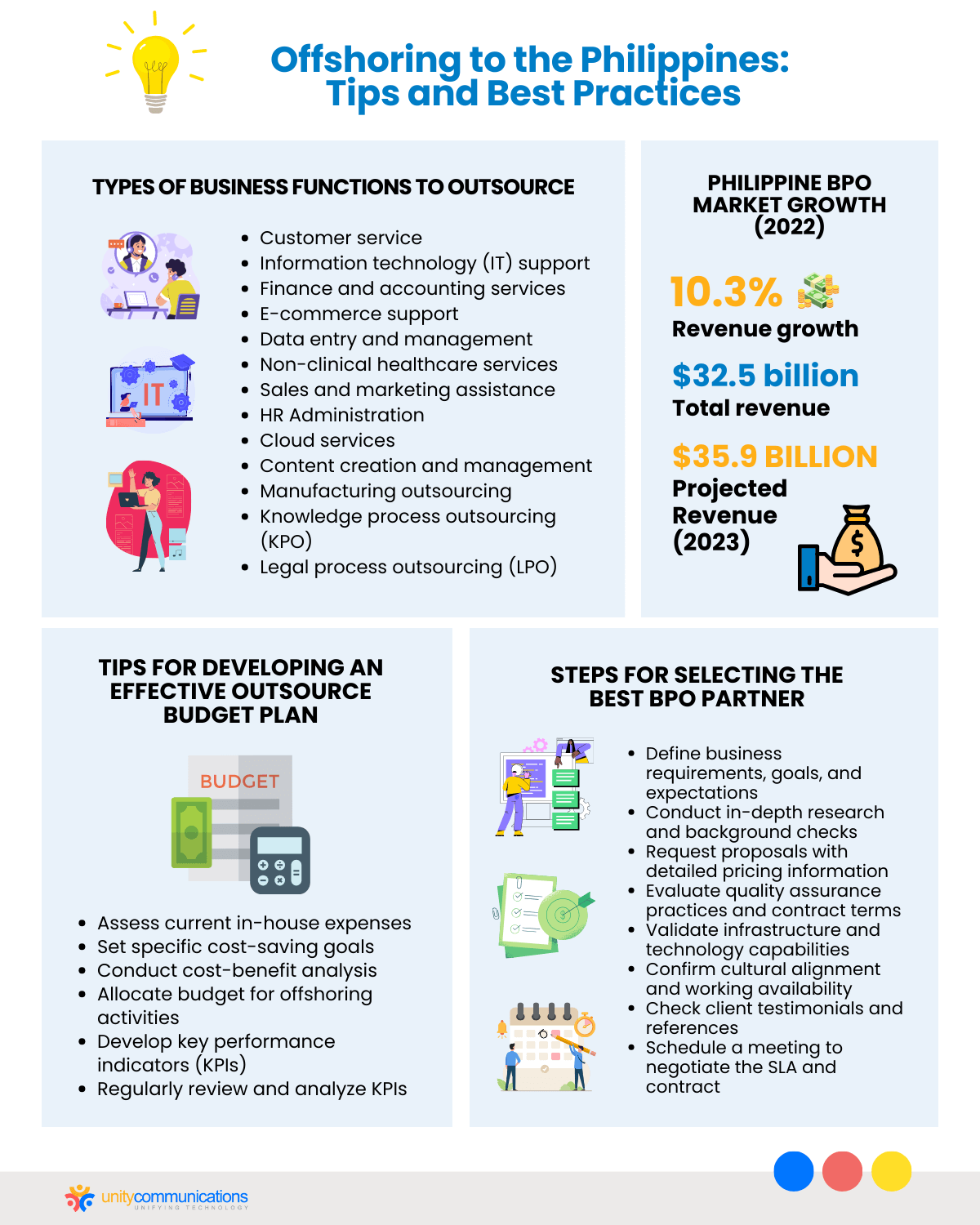IN THIS ARTICLE
Table of Contents
Companies encounter daily inefficiencies and backlogs within their front and back offices. They spend more on non-core processes than primary initiatives to address such gaps.
However, most businesses have found a way to cut their operating expenses significantly. The secret ingredient to their success is outsourcing. Many companies find that working with an offshoring provider in the Philippines allows them to double their cost savings while boosting in-house productivity.
Read on to learn how to optimize such benefits when outsourcing to the Southeast Asian archipelago.
Reducing Costs with Philippine Offshoring

Small, midsize, and large enterprises hire third-party companies to improve their front- and back-office processes. They aim to boost their daily productivity without overspending.
Enterprises wanting to reduce expenses and increase efficiency turn to business process outsourcing (BPO) in the Philippines. Filipino service providers help such companies achieve significant cost reduction in three ways:
Reduce Labor Costs
Businesses of all sizes adopt Philippine BPO to reduce labor costs. For example, Wireless Watchdogs decreased its workforce-related expenditures by 65% after contracting Philippine-based service vendor Unity Communications for help desk assistance.
The Philippines is a developing country in Southeast Asia. Its cost of living and wages are much lower compared to countries such as the United States and the United Kingdom.
To illustrate the cost difference, let us say you set up a customer service team for your online store. You need about 15 customer service representatives (CSRs) for that. If you operate in Virginia, expect labor costs similar to the examples below when you hire in-house versus when you outsource to the Philippines.
| The Cost of Employing 15 In-House vs. Third-Party CSRs | ||
|---|---|---|
| Salary | In-House | Third-Party |
|
| |
| Total | $57,600 | $24,000 |
The data shows that offshoring to the Philippines lets you gain about 60% of the labor cost savings. But aside from their cost-cutting benefits, Filipino CSRs offer more benefits such as:
- Fluency in writing and speaking the English language
- Proven language capability with a 502 Education First English Proficiency Index (EF EPI) score
- Up-to-date career development training and official certifications
- High educational attainment
- Flexibility and eagerness to learn
- Quick adaptation to various work strategies, policies, and procedures
- Resilience, hospitability, and optimism
- High regard for teamwork and collaborative achievement
- Creative, resourceful, and competent spirits
Cut Overhead Expenses
When outsourcing to the Philippines, anticipate cutting overhead expenses and labor costs. From decreased real estate capital to lower compliance fees, offshoring offers considerable cost savings while boosting your repetitive functions. Let us break down such an advantage below:
- Delegating tasks to a Philippine provider eliminates the need for additional office space in your home country. Filipino providers have their workplaces in the country. Some even let their employees work remotely. This arrangement helps reduce rental fees, utility bills, and maintenance costs.
- Philippine offshoring reduces the funds for implementing, maintaining, and upgrading necessary hardware and software technology. Service providers deploy advanced solutions to accelerate the completion of repetitive processes. They do not charge a separate fee for using such equipment unless you only want their platforms.
- Filipino providers handle human resources (HR) administration, including employee benefits, payroll, and other related expenses. Letting providers oversee these employment aspects frees your in-house team from the burden of managing them.
- Philippine offshoring companies assist in meeting complex legal and security requirements. They ensure compliance with related rules and regulations when working with their clients. After all, they know how costly the consequences are when they fail to do so.
Increase Operational Efficiency
Philippine offshoring increases operational efficiency, resulting in substantial cost savings for your business. BPO companies specialize in dealing with repetitive, time-consuming tasks. They have established systems and follow best practices to boost your daily productivity.
The country also houses a diverse pool of skilled and educated talent. These professionals possess the experience and expertise to finish tedious tasks quickly and effectively.
Collaborating with a BPO company from the Philippines enables round-the-clock operations due to the time zone difference. Your offshore team works beyond office hours, ensuring constant progress and uninterrupted service delivery.
Up-to-date technologies such as contact center as a service (CCaaS) help facilitate this 24/7 work cycle. When acquiring customer service outsourcing in the Philippines, your contractors use a cloud-based, integrated communication platform to respond automatically and quickly to common inquiries.
Meanwhile, the cost difference tackled in the previous section improves your budget and resource allocations for core and non-core functions. Entrusting specific front- and back-office functions to a Filipino provider lets you achieve superior outcomes without overspending.
Ways to Maximize Cost Savings with Philippine Offshoring

Because of the above benefits, the Philippine BPO market has experienced continued growth over the years. In 2022 alone, the IT and Business Process Association of the Philippines (IBPAP) recorded 10.3% revenue growth, amounting to $32.5 billion.
IBPAP stated companies will continue offshoring to the country in 2023, leveraging global business services to drive their cost optimization efforts. The organization even predicted that the industry could generate $35.9 billion in revenues in 2023.
Before reaping such advantages, you must know how to strive in the Philippine offshoring market. Secure your cost savings by implementing the following practices:
Choose the Right Outsourcing Package
Begin your Philippine offshoring engagement by choosing the right outsourcing package. Identify the specific functions that need third-party support. Evaluate tasks’ volume, complexity, and turnaround time to understand your outsourcing requirements clearly. Here are a few examples of business functions to outsource:
- Customer service
- Information technology (IT) support
- Finance and accounting services
- E-commerce support
- Data entry and management
- Non-clinical healthcare services
- Sales and marketing assistance
- HR Administration
- Cloud services
- Content creation and management
- Manufacturing outsourcing
- Knowledge process outsourcing (KPO)
- Legal process outsourcing (LPO)
Moreover, assess your in-house capabilities and resources. Determine which tasks your team members can efficiently handle and which the Philippine BPO company can streamline. Consider factors impacting your primary efforts, such as expertise, cost-effectiveness, and scalability.
Create a Well-Structured Budget
When you know what functions to outsource, create a comprehensive budget to ensure cost savings with Philippine offshoring. This stage involves careful consideration and strategic decision-making.
A well-structured budget helps you make informed decisions regarding your BPO investment. Such strategic planning also strengthens your long-term aptitude and competence, expands your market reach, and boosts profitability.
Follow these practical tips for developing an effective budget plan:
- Examine your current in-house expenses related to the functions you want to offshore. List the costs linked to personnel, office space, and equipment. This assessment serves as a baseline for comparison and helps pinpoint potential areas for lowering expenses.
- Clarify your objectives for offshoring to the Philippines. When working with a Filipino service provider, set a specific amount of cost savings you want to attain. Specify how long you aim to achieve the goal to track whether you are progressing with your BPO partner.
- Conduct a comprehensive cost-benefit analysis before signing an official agreement with a provider. Compare your in-house expenses to the potential costs of offshoring to identify savings. This action assists you in determining your BPO program’s financial viability.
- Allot a specific budget for your intended offshoring activities as you draft your plan. This budget should cover labor, real estate, and infrastructure costs. Perform research, ask previous clients, or seek quotes to know a provider’s estimated BPO pricing.
- Develop key performance indicators (KPIs) beforehand to measure the effectiveness of your potential offshoring partnership. These KPIs should include metrics such as cost savings, customer satisfaction levels, productivity improvements, and response times.
- Regularly review and analyze your predefined KPIs to monitor the success of working with Filipino contractors. Make adjustments to your budget plan whenever needed.
Select the Best BPO Partner
Selecting the best BPO provider for maximizing cost savings through Philippine offshoring requires thorough research and evaluation. Note that this deal involves a lot of money; any wrong move means wasting a cent of your hard work. So follow this step-by-step guide to help you make an informed decision and ensure cost reduction:
- Define your business requirements, goals, and expectations that you want to achieve with your potential BPO partner. This phase serves as the foundation for your provider’s screening and evaluation.
- Know what you can gain from collaborating with a Filipino service vendor. Understanding the pros and cons of outsourcing to the Philippines helps you set your expectations and measurable goals.
- Conduct in-depth research and background checks as you short-list your ideal BPO providers from the Philippines. Look for a provider with a good track record, high-level field expertise, and a solid reputation in the industry. Create criteria containing qualifications you want to see in a service vendor.
- Request proposals with detailed pricing information from the short-listed Filipino BPO companies. Compare their pricing models, hourly rates, project-based fees, or long-term contracts. Demand transparency in pricing and ensure the rates align with your budgetary requirements.
- Evaluate each provider’s quality assurance practices and contract terms. Aim for a vendor with robust quality control processes to ensure consistently superior outcomes.
- Validate the infrastructure and technology capabilities of every Philippine BPO company. Consider up-to-date IT systems, robust security measures, and strict data protection protocols.
- Confirm cultural alignment, centralized communication, and working availability of your potential third-party team. This step helps avoid misunderstandings, conflicts, and project delays.
- Browse official company websites for client testimonials or request references from each BPO provider. You can also directly contact their existing or past customers for feedback. The collected insights inform you about the provider’s reliability, performance, and service quality.
- Narrow down your choice to a Philippine offshoring provider that best meets your requirements and goals. Discuss the scope of work, performance expectations, pricing details, and other relevant terms and conditions.
- Schedule an in-person or virtual meeting with the selected provider. Negotiate every detail of your service-level agreement (SLA). Make sure to align each other’s work strategies and objectives. Sign and seal the contract once you are satisfied with the provisions.
Leverage Advanced Solutions
Philippine offshoring providers use artificial intelligence (AI) technology and automation to accomplish work faster, allowing their clients to save costs. These advanced solutions reduce reliance on manual labor as they automate and speed up task completion.
This capability allows you to optimize your third-party workforce, fulfilling the same output level with fewer Filipino workers. Reducing the number of needed personnel helps further minimize labor costs when working with a Philippine service provider.
Besides, AI and automation technologies contribute to enhanced accuracy. Such tools follow predefined rules and algorithms, minimizing the likelihood of human errors, which caused 82% of data breaches in 2022. This feature saves time and prevents costly mitigation efforts that influence your operations and customer satisfaction rates.
Most importantly, modern technology, such as cloud-based contact center software, enables seamless collaboration between your onshore and offshore teams. With video conferencing, instant messaging, and project management software, you can bridge the distance and maintain real-time cooperation with your BPO team in the Philippines.
The Bottom Line

Offshoring to the Philippines offers significant cost savings in labor, office space, technology infrastructure, and other overhead expenses. Achieving this benefit requires you to specify your business requirements and carefully plan your budget.
Following the best practices above helps you select the provider that matches your strategies and uses advanced technology to meet your daily needs. If you do your research and due diligence, expect to reduce your expenditures while boosting efficiency.
Contact Unity Communications today if you want high-quality service at an affordable cost. The award-winning offshoring provider has a skilled talent pool and robust technology to streamline routine tasks.





